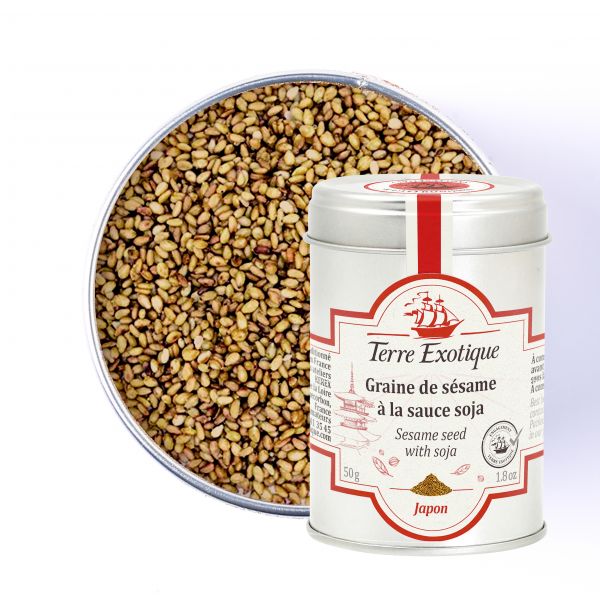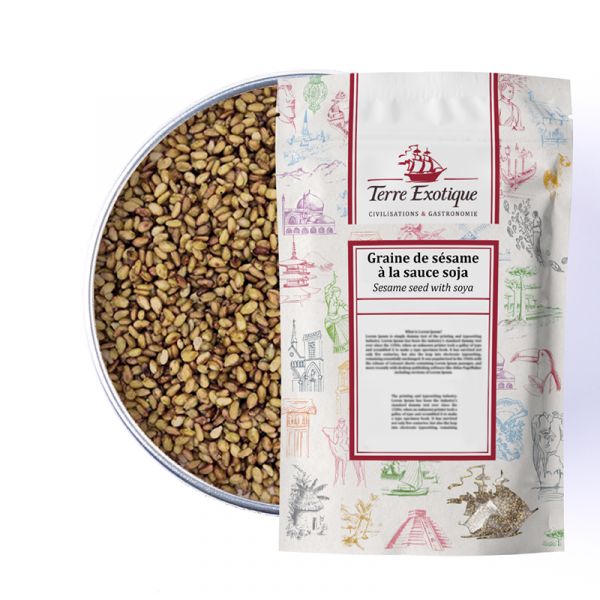





In which dishes to use sesame seeds with soy sauce?
Sesame seeds flavored with soy sauce are the foundation of Asian cuisine, particularly Japanese cuisine. Subtle and full of flavors, they will add a touch of originality to your preparations.
How to use sesame seeds with soy sauce in cooking?
Here are some recipe ideas to use sesame seeds with soy sauce in your cooking:
Inverted sushi rolls with sesame:
Sprinkle sesame seeds with soy sauce on your rice before adding your ingredients and rolling it all up.
Sesame bread:
Sprinkle one tablespoon of sesame seeds with soy sauce on your bread dough before baking it.
Chicken yakitori with sesame seeds:
After marinating your chicken pieces, roll them in sesame seeds with soy sauce and then brown them in a frying pan.
Sesame appetizer crackers:
Add 1 tablespoon of sesame seeds with soy sauce to your shortcrust pastry and then cut it into pieces.
Sesame feta sticks:
Cut your feta into slices, then roll them in honey and sesame seeds with soy sauce, and finally, brown them in a pan for a few minutes.
The flavors of sesame seeds with soy sauce
Sesame seeds flavored with soy sauce reveal flavors of caramelized hazelnuts, both salty and sweet. In the mouth, they leave a gentle and highly flavorful roasted seed taste.
The botany of sesame seeds
What are sesame seeds?
Sesame, or Sesamum indicum, is a plant from the Pedaliaceae family. This plant is widely cultivated in regions such as Africa and Asia for its seeds. Whether used raw, toasted, or ground, sesame seeds are very common in European, Asian, and American cuisine.
How is soy sauce made?
Soy sauce is traditionally made from soybeans, sometimes mixed with wheat. The sauce is obtained through the release of enzymes during fermentation.
Rich in amino acids that give it its salty flavor, soy sauce is traditionally used for marinades and to flavor rice.
The history of sesame seeds
Sesame seeds originated in East India. Around 3,000 years BC, the Chinese used sesame seeds as ink by transforming them into oil and burning them to obtain a black color. Over time, sesame seeds have traveled across the world to finally be used in kitchens in the form of oil, pastes, plain seeds, or flavored seeds.
| Allergen | Sésame, soja / Sesame, soy |
|---|---|
| Native country | JAPON |
| Ingredients | roasted SESAME, SOY sauce 8.14% (SOY, salt, koji, alcohol), sugar, |
| flavour enhancers (E621, E627, E631), salt, water, coloring (E150a | |
| caramel). Possible traces of: peanut, gluten. | |
| Nutritional Info | VN Energie pour 100 g (energy for 100g) : 2477 kJ / 592 kcal VN Matière grasse (fat) : 47.5 g Dont acide gras saturés (of which saturated fat) : 7.4 g VN Glucides (carbohydrate) : 22.4 g Dont sucres (of which sugars) : 4.7 g VN Protéines (protein) : 18.7 g Vn Sel (salt) : 7.2 g |
| TRACES EVENTUELLES D'ALLERGÈNES | céleri, sésame, moutarde, fruits à coques. |
 Français
Français 